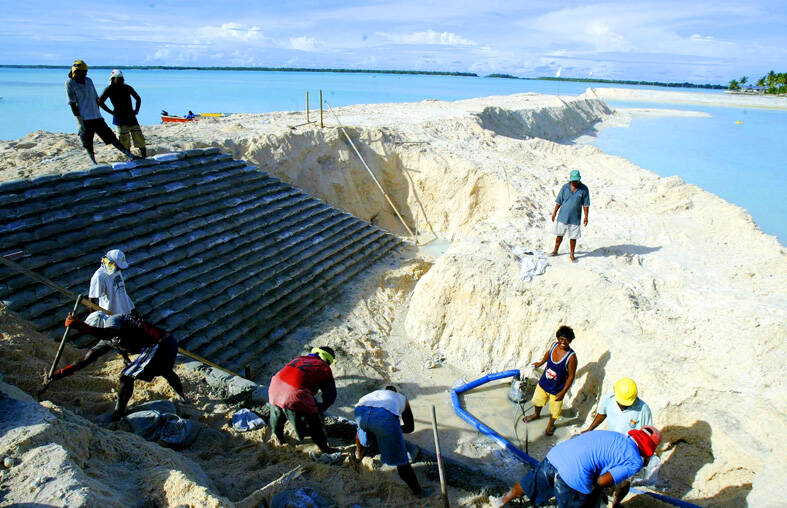Pacific nation Kiribati says it is exploring a deep-sea mining partnership with China, dangling access to a vast patch of Pacific Ocean harboring coveted metals and minerals.
Beijing has been ramping up efforts to court Pacific nations sitting on lucrative seafloor deposits of cobalt, nickel and copper — recently inking a cooperation deal with Cook Islands.
Kiribati opened discussions with Chinese Ambassador Zhou Limin (周立民) after a longstanding agreement with leading deep-sea mining outfit The Metals Co fell through.

Photo: AP
“The talk provides an exciting opportunity to explore potential collaboration for the sustainable exploration of the deep-ocean resources in Kiribati,” the government said on Monday evening in a statement.
Pacific nations Kiribati, Cook Islands and Nauru sit at the forefront of a highly contentious push to mine the depths of the ocean.
Kiribati holds rights for deep-sea mining exploration across a 75,000km2 swathe of the Pacific, in a region known as the Clarion Clipperton Zone. Through state-backed subsidiary Marawa Research, Kiribati had been working with Canada-based The Metals Co to explore the mineral deposits. However, that agreement was terminated “mutually” at the end of last year, the company told AFP.
A Kiribati fisheries official said the nation was now exploring opportunities with other foreign partners.
The Metals Co said Kiribati’s mining rights were “less commercially favorable” than other projects with Pacific nations Nauru and Tonga.
Kiribati’s announcement comes as international regulators begin a series of crunch meetings that could decide the fate of the nascent industry. The Metals Co and other industry players are pushing the International Seabed Authority to set rules allowing large-scale exploitation.
Kiribati, a climate-threatened archipelago that is home to about 130,000 people, lays claim to an ocean expanse that forms one of the largest exclusive economic zones in the world.
Kiribati President Taneti Maamau’s administration in 2019 severed diplomatic links with Taiwan in favor of China.
Chinese companies have in recent years been granted rights to harvest Kiribati’s profitable fisheries — one of the nation’s few natural resources besides minerals.
A visiting cadre of Beijing police have also visited the capital, Tarawa, to help train local Kiribati forces.
Tessie Lambourne, a leading member of Kiribati’s opposition, said China seemed to be seeking access to “our maritime space for its own interest.”
“I always say that our government is bending over backwards to please China,” she said.
China and Cook Islands last month struck a five-year cooperation agreement to study the Pacific nation’s seabed mineral riches. The deal did not include any exploration or mining license.
Companies hope to earn billions by scraping the ocean floor for polymetallic rocks, or nodules, that are loaded with manganese, cobalt, copper and nickel — metals used to build batteries for electric vehicles.
Nauru and Kiribati believe the industry holds the key to economic prosperity in a region where scarce land is already under threat from rising seas.
However, Palau, Fiji and Samoa are staunchly opposed, pushing for lingering environmental questions to be cleared up before anyone takes the plunge.

‘EYE FOR AN EYE’: Two of the men were shot by a male relative of the victims, whose families turned down the opportunity to offer them amnesty, the Supreme Court said Four men were yesterday publicly executed in Afghanistan, the Supreme Court said, the highest number of executions to be carried out in one day since the Taliban’s return to power. The executions in three separate provinces brought to 10 the number of men publicly put to death since 2021, according to an Agence France-Presse tally. Public executions were common during the Taliban’s first rule from 1996 to 2001, with most of them carried out publicly in sports stadiums. Two men were shot around six or seven times by a male relative of the victims in front of spectators in Qala-i-Naw, the center

Canadian Prime Minister Mark Carney is leaning into his banking background as his country fights a trade war with the US, but his financial ties have also made him a target for conspiracy theories. Incorporating tropes familiar to followers of the far-right QAnon movement, conspiratorial social media posts about the Liberal leader have surged ahead of the country’s April 28 election. Posts range from false claims he recited a “satanic chant” at a campaign event to artificial intelligence (AI)-generated images of him in a pool with convicted sex offender Jeffrey Epstein. “He’s the ideal person to be targeted here, for sure, due to

Australia’s opposition party yesterday withdrew election promises to prevent public servants from working from home and to slash more than one in five federal public-sector jobs. Opposition leader Peter Dutton announced his conservative Liberal Party had dropped its pledge that public servants would be required to work in their offices five days a week except in exceptional circumstances. “I think we made a mistake in relation to this policy,” Dutton told Nine Network television. “I think it’s important that we say that and recognize it, and our intention was to make sure that where taxpayers are working hard and their money is

DISPUTE: Beijing seeks global support against Trump’s tariffs, but many governments remain hesitant to align, including India, ASEAN countries and Australia China is reaching out to other nations as the US layers on more tariffs, in what appears to be an attempt by Beijing to form a united front to compel Washington to retreat. Days into the effort, it is meeting only partial success from countries unwilling to ally with the main target of US President Donald Trump’s trade war. Facing the cratering of global markets, Trump on Wednesday backed off his tariffs on most nations for 90 days, saying countries were lining up to negotiate more favorable conditions. China has refused to seek talks, saying the US was insincere and that it